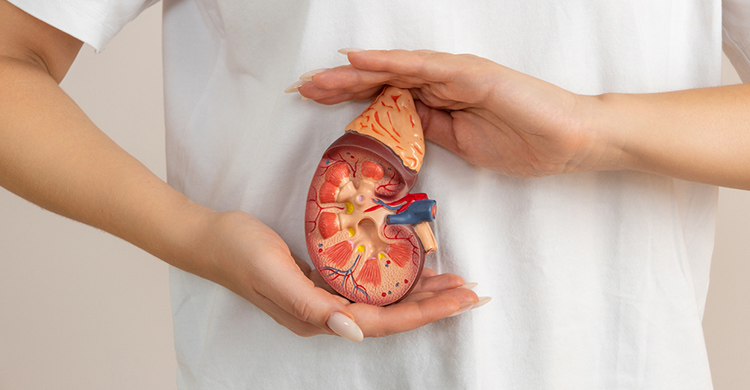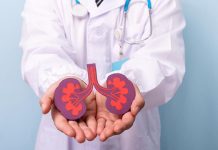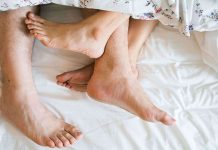
What is a Kidney Cyst?
A kidney cyst is a sac filled with fluid that grows on the kidney. The kidneys are responsible for filtering waste from the bloodstream to produce urine.
There are four types of kidney cysts, with the most common type being called non-cancerous cysts or simple kidney cysts.
Causes of Kidney Cysts
The exact cause is not yet known. However, when the surface layer of the kidney weakens, kidney cysts will form and develop into sacs (diverticulum).
Subsequently, these sacs will fill with fluid, detach, and become cysts. This condition generally occurs with age.
Risk Factors for Kidney Cysts
Several risk factors can increase the likelihood of developing these cysts, including:
- Age: The risk of cysts increases with age. These cysts often appear in individuals over 50 years old.
- Gender: Women have a higher risk compared to men of developing cysts.
- Family History: If a family member has a history of kidney cysts, your risk of experiencing a similar condition may increase.
- Polycystic Kidney Disease (PKD): PKD is a genetic disease that can cause cyst growth in the kidneys. If you have a family history of PKD, you have a higher risk of experiencing it.
- Hypertension (High Blood Pressure): Individuals with high blood pressure have a higher risk of experiencing it. Conversely, kidney cysts can also cause hypertension.
- Kidney Injury: Kidney injuries can increase the risk of cyst formation.
- Genetic Disorders: Some specific genetic disorders, besides PKD, can also contribute to cyst formation.
- Chronic Kidney Disease: Individuals with chronic kidney disease may be more vulnerable to cyst formation.
- Smoking: Some studies suggest that smoking can increase the risk of cysts.
- Obesity: Obesity can contribute to cyst development.
It is important to note that not everyone with these risk factors will experience these types of cysts, and some individuals without these risk factors may still develop the condition.
If you have concerns or specific risk factors, it is important to consult a doctor for further evaluation.
Symptoms of Kidney Cysts
Usually, these cysts do not cause specific signs or symptoms. Symptoms will appear when the cysts grow large enough or press on other organs.
These symptoms include:
- Fever, chills, or other signs of infection.
- Pain that occurs in the back, waist, or upper abdomen.
- Frequent urination.
- Blood in the urine or dark-colored urine.
- Decreased kidney function (rarely occurs).
Additionally, there are other symptoms in polycystic kidney disease, such as:
- High blood pressure (hypertension).
- Feeling of pain or swelling in the abdomen.
- Feeling of pain in the back of the kidneys due to swelling.
- Presence of protein in the urine.
- Finding kidney stones.
Diagnosis of Kidney Cysts
Doctors will diagnose cysts by conducting a medical interview, physical examination, and diagnostic tests, such as:
- Imaging using ultrasound, CT scans, or MRI: Detecting the presence of cysts through generated images.
- Blood tests in the laboratory: Showing disturbances in overall kidney function.
- Urine tests: Observing the presence of blood or protein in the urine.
Treatment of Kidney Cysts
If there are no symptoms or kidney function disorders in the body, kidney cysts do not require special treatment.
Sometimes, cysts can disappear on their own without treatment.
Individuals diagnosed with kidney cysts are advised to undergo repeat kidney imaging tests every 6 to 12 months to monitor the development of cysts.
If the size of the cyst increases significantly and causes other symptoms, doctors may recommend cyst treatment, including:
-
Cyst removal surgery
Removal is done by making an incision in the skin to drain the fluid from the cyst, and then cutting or burning the kidney wall containing the cyst.
-
Cyst drainage
Usually followed by filling the cyst with alcohol. Doctors will do this by inserting a small needle through the skin until it penetrates the cyst wall.
After the fluid is drained, the doctor injects alcohol into the cyst cavity, which hardens the surrounding tissue to prevent the cyst from reforming.
If someone has kidney cysts, it is also recommended to:
- Avoid and reduce physical contact sports, especially if the kidney is swollen, making it vulnerable to injury.
- Undergo scans, blood pressure checks, and routine blood laboratory tests to monitor kidney function.
- Avoid the use of pain relievers.
Complications of Kidney Cysts
Some complications due to kidney cysts include:
- Ruptured cysts can cause severe pain in the back or side, between the ribs and pelvis.
- Infection in the cyst causing pain and fever.
- Urinary problems due to obstruction caused by kidney cysts.
- Kidney failure due to kidney function damage.
- Hypertension, which then increases the risk of heart attacks and strokes.
Prevention of Kidney Cysts
Some prevention efforts for kidney cysts include:
- Regular annual health check-ups.
- Regular exercise to improve kidney health.
- Balanced diet by reducing fatty and sugary foods.
- Avoiding stress that can trigger or worsen signs and symptoms.




